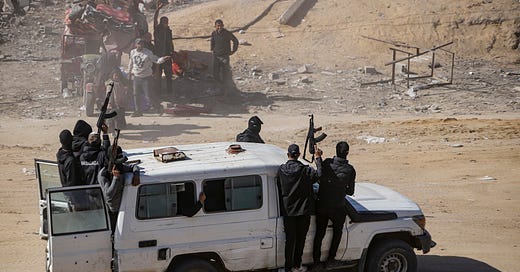What Really Drove Hamas to Launch the October 7 Attack?
The minutes of a panicky meeting on October 2 shed new light.
Cash-strapped Hamas can’t pay fighters as Israeli offensive hits funding sources—report. (The Times of Israel)
Why did Hamas choose to perpetrate its October 7 atrocity when it did? Some claim it had to do with a perception that Israel had been weakened by its growing internal rift over the judicial-overhaul issue. There’s evidence for that, but its significance can be overestimated.
The Wall Street Journal reports that, “according to minutes of a high-level meeting in Gaza [on October 2] that Israel’s military said it discovered in a tunnel beneath the enclave”—see the article for a photo reproduction of the minutes—Hamas launched the October 7 attack because it was
aiming to torpedo peace negotiations between Israel and Saudi Arabia….
Days before the assault that left nearly 1,200 dead, Yahya Sinwar, Hamas’s Gaza chief, told fellow militants that an “extraordinary act” was required to derail the normalization talks that he said risked marginalizing the Palestinian cause, the document…said.
The Journal claims that “the plan worked—at a terrible price”—a price that included not only loss of life and destruction in Israel and Gaza, but also
anger across the Arab world and beyond, halting progress toward normalization, at least for now.
President Trump, visiting Riyadh on Tuesday, acknowledged as much, calling on Saudi Arabia to establish relations with Israel but saying, “You’ll do it in your own time.”
The minutes of the October 2 meeting also cite Sinwar—eventually killed by Israeli troops in October 2024—saying:
“There is no doubt that the Saudi-Zionist normalization agreement is progressing significantly.” He warned a deal would “open the door for the majority of Arab and Islamic countries to follow the same path.”
For Hamas and the rest of its Iranian-led axis, such normalization between Israel and the Arab and Islamic world was the worst catastrophe possible because it could impede the—for them—sacred cause of the destruction of Israel and genocide of its citizens.
Is the Journal right in its gloomy assessment that Hamas’s strategy—alongside its dire costs—has succeeded, at least for now, in setting back the prospects of such normalization?
It’s still too early to say—but it’s worth noting that one Israeli observer takes a different view. Dan Schueftan, who heads the International Graduate Program in National Securities Studies at Haifa University, is anything but a Pollyanna, notable for hard-headed, no-nonsense, deeply insightful articles and interviews on Israel and the Middle East.
In Britain’s Jewish Chronicle, however, Schueftan offers a much more upbeat take on the outcomes of what began on October 7, 2023—which include, of course, Israel’s military successes against Hamas, Hizballah, and Iran itself:
In the regional arena, Israel has already won the war that started on [that day]. While the fighting is not over yet, a confrontation with Iran is potentially dangerous and there is no sustainable “solution” available in Gaza, the balance of power in the Middle East shifted dramatically in favour of the Jewish state and its de-facto Arab allies.
The radicals have never been more humiliated, isolated, vulnerable and intimidated and the moderate, stability-seeking Arab regimes have only rarely felt more self-assured and surreptitiously grateful for the Israeli resolve in fighting their common enemies.
What of those Arab regimes’ often harsh rhetoric regarding Israel’s warfare in Gaza, which repeats the stock calumnies about indiscriminate killing and starvation?
Schueftan sees, beneath the surface, a different reality:
Arab leaders, particularly in the Gulf, were deeply impressed by Israel’s demonstrated ability to do what they themselves craved: to consistently deepen and widen its alliance with the United States, even during unfriendly administrations, while, at the same time ignoring and even openly rejecting ill-advised directives from Washington on critical issues of national security.
…The objective of consolidating an American-led regional structure incorporating Israel, Saudi Arabia and other Arab states is somewhat more difficult in the immediate future.... The Middle East as a whole, however, has taken a major turn in the last year and a half—a turn for the better, for a change. The radicals are much weaker. Consequently, the mainstream stability-seeking Arab states are more confident.... The region is still volatile and a lot depends on containing Iran, but the chances to avoid a catastrophe are better than they have been in a long time and everybody recognises Israel’s indispensable contribution.
There are still questions about the role in this “new Middle East” of Erdogan’s Turkey and the new al-Sharaa regime in Syria. Although President Trump appears buoyantly optimistic about these actors, Israel still harbors deep suspicions toward both of them. It may be, though, that while Sinwar succeeded to ignite a maelstrom of violence and death, his larger designs will fail.





